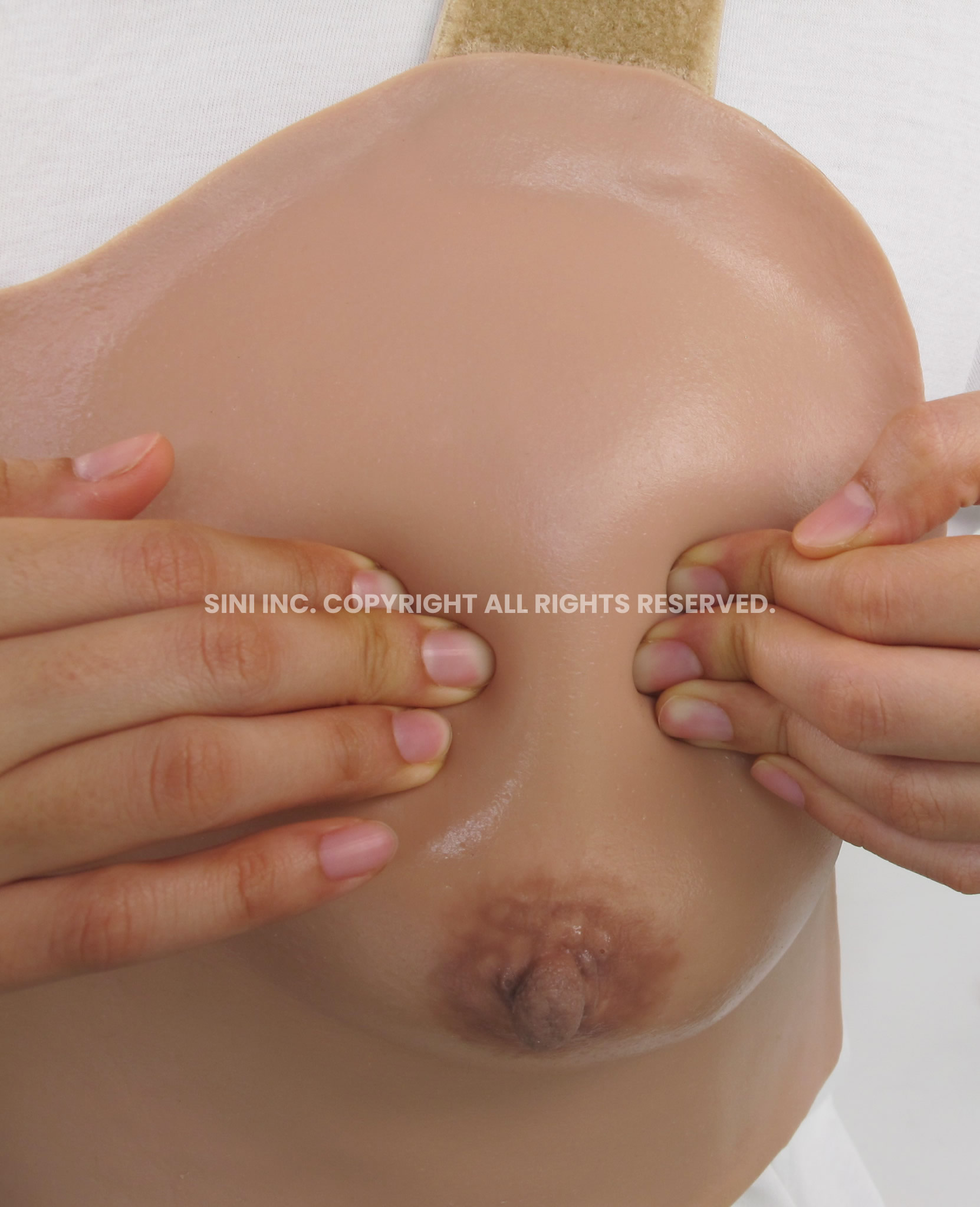Skill Trainers
- Trucorp - Airway
- Trucorp - AirSim® model Difficult Airway Model
- BT - ALS Cardiac Training Model - Basic
- BT - Airway Management Simulator
- BT - Tube Feeding
- Nasco - Birthing Simulator
- Nasco - Wound Care
- Nasco - Catheter
- Nasco - Suture Kit
- SKILLQUBE - Simulation System
- SINI- Breast Anatomy Lactation Model
- SINI- Breast Anatomy Model Torso
- SINI- Femoral Puncter Trainer
- SINI- Knee Aspiration Trainer
- SINI- Knee Surgery Trainer

Trucorp AirSim® model
It is ideal for training in airway management and awake fiberoptic intubation. It features the uniquely constructed AirSim® airway for realistic feedback during airway management procedures. Visually and anatomically correct, the nasal cavity and airway include important internal landmarks for training in nasotracheal intubation and nasally directed fiber optic examination.
Features
- Innovative AirSim® airway and nasal cavity created from CT DICOM data
- Anatomically correct internal features and visually accurate landmarks in airway & nasal passage
- Inflatable tongue with lifelike texture can simulate edema
- Replaceable lung bags inflate with successful ventilation
- Esophagus and replaceable bag representing stomach
- Optional difficult airways available for more advanced training
Medical Procedure Training
- Single nasotracheal intubation
- Full range of supraglottic device insertion
- Direct laryngoscopy
- Fibre optic intubation & examination
- Endotracheal tube insertion
- Combi tube insertion
- Nasogastric (NG) tube insertion techniques
- Single lung isolation techniques

AirSim Difficult Airway
Product Code:DA91100
Adult intubation head trainer provides a solution for varying degrees of difficulty when practicing airway management. This versatile model ranges from challenging to very difficult to intubate, facilitating a variety of training scenarios from beginner to advanced users .
The AirSim Difficult Airway has been designed to improve management of the unanticipated difficult intubation in accordance with the Difficult Airway Society guidelines.
Model Features
Difficult Airway
- The internal airway has an enlarged tongue, swollen posterior cartilages and an elongated epiglottis to provide a challenging airway management user experience.
Laryngospasm
- Adjustable from normal to complete airway obstruction.
- Sudden closure of the vocal cords can be simulated.
- Upon successful user action, laryngospasm can be mechanically reversed to provide positive feedback
Displaced larynx
- Ability to displace the larynx into a more anterior position to make visualisation of the vocal cords more challenging.
- Adjustable to provide various levels of difficulty.
Tongue Edema
- The tongue can be swollen to simulate various degrees of tongue angioedema.
Receding / protruding Mandible
- Various degrees of malocclusion, one mandibular variant and two maxillary variants.
- Overbite and underbite features simulated
Trismus
- Ability to grossly restrict mouth opening to make insertion of airway devices more challenging
Neck lock / Head rotation restriction
- Ability to simulate cervical arthropathy through restricting the range of motion of cervical spine
- Neck lock / Head rotation restriction
Simulate needle and surgical cricothyroidotomy and percutaneous tracheostomy.
- Easy identification of sternal notch, tracheal rings & cricoid and laryngeal cartilages
- Interchangeable larynx allows quick and easy repeated use
- Wraparound replaceable neck skin rotates for 10-15 incisions
All features can be activated quickly and effortlessly by the instructor to create a more challenging or easier experience. The features can be used in isolation or combined to deliver a scenario with numerous variations of difficulty.

ALS Cardiac Training Model – Basic : BT-ACTB
Training Model
Product Code: BT-ACTB
KEY FEATURES
– Simulator for adult resuscitation training and evaluation
– Lifelike body structure and silicon; Realistic training
– Various emergency simulation
– Rechargeable battery, completely wireless environment through Wifi and Bluetooth communication
– Pupillary reflex; Patient assessment and evaluation
– While chest compression, generate related pulse and check the ECG change from the patient monitor
– Possible to do chest compression and ventilation at the same time
– Palpate pulse at 8 sites (Left radial and brachial, left and right carotid/femoral/dorsal)
– Change the pulse strength and turn each pulse off/on
– Virtual patient monitor layout can be adjusted by selecting needed items
– When running a prepared scenario, the current patient status can be jumped to the next status by using a transition
– Scenario, Checklist can be exported or imported
– The result data can be printed out by using a printer connected to a facilitator laptop
– The detailed CPR result and even log can be saved to Excel format
– The event log can be sorted by item or time order
Specification
Eyes
– Light Reflex / Consensual Light Reflex
– Adjust pupil size
: 1~8mm
– Adjust light reflex speed
: Prompt / Slow
– Eyelids : Open / Closed
Airway management
– Head Tilt / Chin Lift
– Jaw Thrust
– Bag-Valve-Mask ventilation
– Oral / Nasal Intubation
: ETT / LMA / I-gel / Combi-tube
: Detect Normal / Right mainstem intubation
– Detect esophagus Intubation and gastric inflation
– Measure force on incisors
– Airway obstruction
– Needle decompression
Circulation
– 3-4 Lead ECG
– Defibrillation and cardioversion
: Defibrillation waveform
: CPR waveform
– Heart sounds auscultation (2 sites)
: Aortic valve / Mitral valve
– Pulse
– Pulse sites
: Radial / Brachial artery (Left arm)
: Left / Right Carotid artery
: Left / Right Femoral artery
: Left / Right Dorsalis artery
– Pulse intensity
: Strong / Moderate / Weak
– NiBP
: Palpation
: Auscultation
– ABP waveform (Software)
– PAP waveform (Software)
Breathing
– Spontaneous breathing
: Unilateral and bilateral chest rise
: Normal breathing sound
– Lung sounds auscultation (4 sites)
: Chest Front Left Up / Down
: Chest Front Right Up / Down
– SPO2 waveform (Software)
– ETCO2 waveform (Software)
CPR
– Chest compression
: Compression depth
: Hand position (Correct/Upper/Lower/Left/Right)
: Compression rate
: Incomplete release
: Hands-off time
– Artificial respiration
: Ventilation volume
: Ventilation time
: Ventilation per minute
Vascular access
– IV (Right arm)
– IO (Right tibia / Right humerus)
– IM (Right humerus)
– Medication (Software)
Speech
– Vocal sounds
: 10 cases

Difficult Airway Management
Training Model
Product Code: BT-CSIE-D
Airway Management Simulator for evaluating the intubation depth and accuracy through a tablet
KEY FEATURES
- Airway complication
- Tongue edema : Automatic
- Surgical airway
- Cricothyrotomy
- Airway management
- Insert OPA/NPA
- Intubate ETT / I-GEL
- Training and evaluation with S/W
- Pharynx swelling : Automatic
- Laryngospasm : Automatic
- Trismus : Manual
- Neck lock : Manual
PRODUCT COMPOSITION
- Adult upper body model
- Software (Android only)

BT Tube feeding & Tracheostomy care & Suction training Model : BT-CSIS
– Realistic training with anatomically correct structures.
– Oral/Nasal feeding tube injection.
– Check tube placement by auscultation with stethoscope.
– Practicing with a real liquid food
– Easy to maintain ; Detachable stomach and trachea.
– Positioning with a stand by adjusting the angle. (0°, 21~45°, 90°)
– Checking tube placement through transparent window
– Training tube feeding, PEG care, Tracheostomy care, suction, gastrostomy tube care
– Adult upper torso : 7.8㎏ (310×700×238㎜)
– Storage case : 7㎏ (380×820×270㎜)
– Total : Approximately 15㎏

Nasco Life/form® Birthing Station Simulator
The Life/form® Birthing Station Simulator is designed to facilitate demonstration and practice of palpating the internal birthing canal. The simulator clearly shows the relationship between the fetal head and the ischial spines of the pelvic bone of the mother during the birth process.
The simulator highlights the ischial spines which are of great obstetrical importance. The line drawn between the ischial spines typically represents the shortest diameter of the pelvic cavity. The ischial spines can be readily felt during a vaginal examination, and serve as valuable landmarks in ascertaining the level to which the presenting part of the fetus has descended into the pelvis.
- The Birthing Station Simulator features a fetal head which will lock in any one of three lock stations.
- Minus Two Station shows the position of the fetal head when it lies above the ischial spines.
- Zero Station shows the fetal head directly between the ischial spines.
- Plus Three Station shows the fetal head below the ischial spines ready to enter into the birthing canal.
The Life/form® Birthing Station Simulator includes teaching guide and hard carry case.
Size: 23 in. x 14 in. x 7 in.

Nasco Life/form® Pressure Ulcer/Bedsore Models
Pressure ulcers, also known as bedsores or decubitus wounds, affect over one million adults every year.
The wounds can range from superficial and mildly red on the skin surface to an extremely infected, deep, open wound penetrating down to the bone with blackened or dead tissue. These models illustrate all four wound stages and are used to give instruction on the care and cleaning of the ulcers.
The four stages include:
- Stage 1 – Reddening, unbroken skin
- Stage 2 – Open wound that is reddened with partial skin loss
- Stage 3 – Deep, open wound that reaches through all layers of skin and into the muscle
- Stage 4 – Severe, deep, open wound that reaches through all layers of skin and damages muscle, bone, tendons, and joints

Nasco Life/form® Male & Female Catheterization
The Male & Female Catheterization Simulator Set trains all nursing students the skills and techniques of Catheterization.
In addition, catheterization simulators are useful for anatomical identification and demonstration of perineal care. The realism of Nasco Life/form® Catheterization Simulators will help your students bridge the gap, from classroom to bedside, with ease and comfort.

Nasco Life/form® Suture Kit
The Life/form® Suture Kit is an inexpensive kit that offers practicing sutures at all levels.
The instructor or student will have the ability to make incisions and determine the depth of suturing and the technique to be used.
Practice and demonstrate tying knots, stapling and placement of staples, use of surgical glue, suturing deep tissue (placement and closure), and suturing subcutaneous tissue (placement and closure).
Features epidermis, dermis, fascia, fat, and muscle layers. The skin will allow placement and closure of superficial sutures.
Includes suture pad, tray to hold pad (not shown), durable carry case, needle holder, suture scissors, tissue forceps, scalpel, nylon suture, and small carry case to hold the instruments.
Pad measures 6 in. L x 4 in. W x 1-1/2 in. D.

qube15
In operation around the world.
The qube15 has a fully functional ECG monitor with a fully integrated AED/defibrillator, dynamic 12-lead ECG, wireless control unit for instructors and an assessment solution for auscultation, blood glucose and temperature measurement. The software is controlled by a wireless controller with an intuitive-to-use user interface.The Skillqube simulation system qube15 is based on LIFEPAK15 and was designed in partnership with STRYKER. Together with Stryker we have designed an easy-to-use and cost-effective simulation solution. With the qube15 Skillqube has developed a highly functional simulation system that helps to prepare healthcare professionals for emergencies.

Breast Anatomy Lactation Model
This realistic soft breast model has three different sizes of lumps under the skin for palpation practice. Also, there is discoloration on the right breast. You can feel the mammary gland during the period of lactation on both breasts. It can be used for both medical professionals’ palpation practice and education on patients’ self-examination.
The model is wearable with velcro straps. medical professionals can improve their communication skills during the examination and patients’ can learn in much more realistic situations.
ModelC-BAL-01DevelopmentSINISkills1. Breast lump palpation skills2. Education of patients’ self-examination3. Communication skills with patientsFeatures1. Lumps inside for palpation2. Realistic soft tissue response3. Anatomically accurate structure4. WearableSpec+Breast Model x 1ea– 430mm*250mm*75mm / 1kg

Breast Anatomy Model Torso
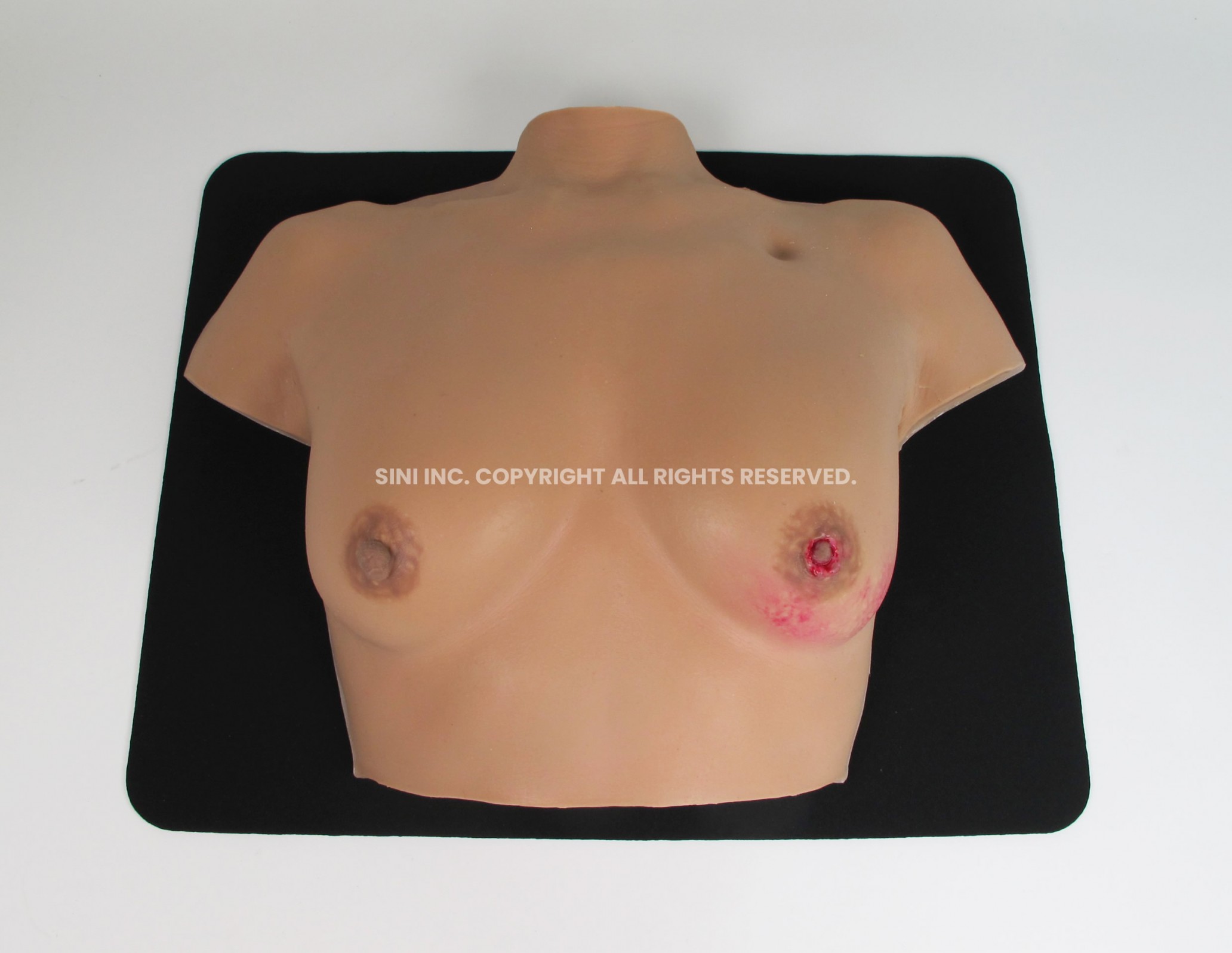
This realistic soft breast model has different sizes of lumps buried under the skin for palpation practice. Also, there is discoloration on the right breast. It can be used for both medical professionals’ palpation practice and education on patients’ self-examination.
ModelC-BAT-01DevelopmentSINISkills1. Breast cancer palpation skills2. Education of patients’ self-examinationFeatures1. Lumps inside for palpation2. Realistic soft tissue response3. Anatomically accurate structureSpec+Breast Torso x 1ea– 450mm*350mm*130mm / 4.5kg

Femoral Puncter Trainer
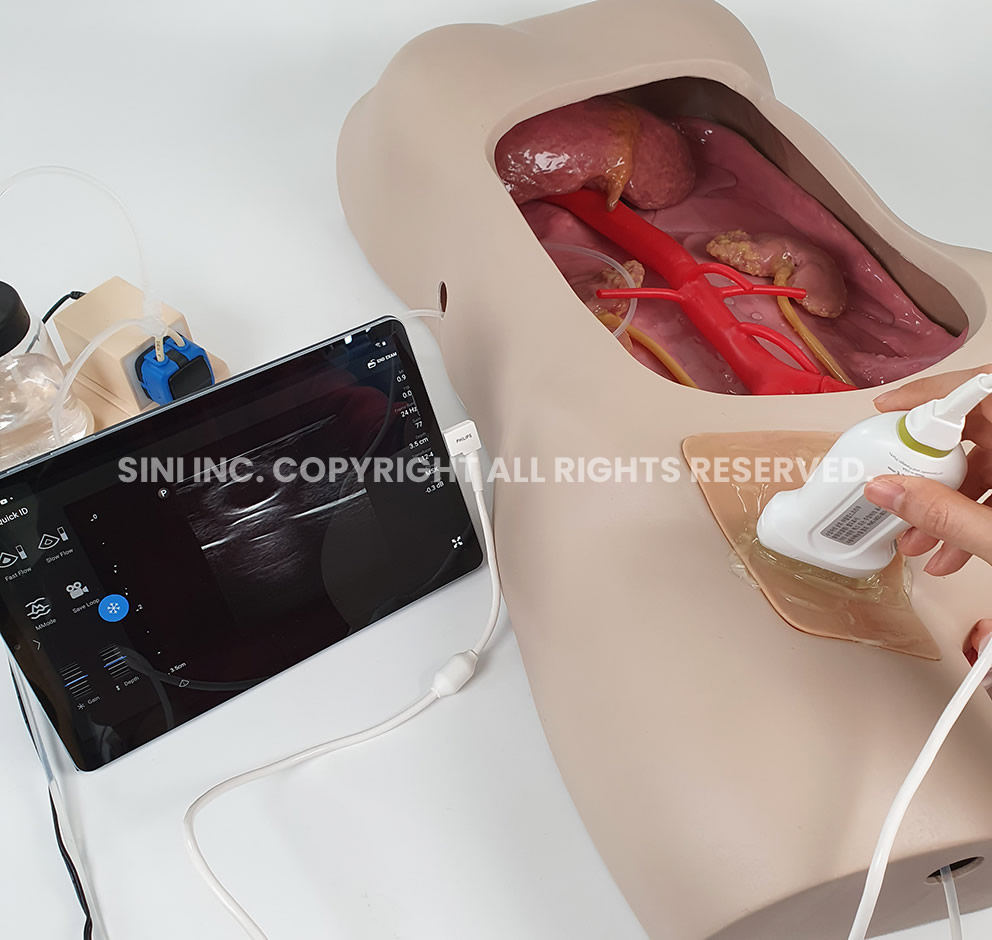
This trainer is designed for practice to find the right location to make a puncture for femoral arteries. It has a structure of the liver, kidneys, ureter, aorta, bladder, and uterus as well as the pump with motor. The pump simulates blood circulation through the trainer. Ultrasound is applicable, so you can find the vessels under the skin pad.
We simulate the different skin layers and organs with different materials so that you can feel the realistic tissue response. The material has high durability to provide multiple times of use. The skin pad with the vessel is replaceable, after numerous times of puncture practices, you can replace or purchase extra skin pads to reuse the housing and other components.
ModelL-FEP-01DevelopmentSINI with Seoul National UniversitySkills1. Femoral Puncture skills2. Tissue managementFeatures1. Realistic tissue response2. Anatomically accurate structure3. Ultrasound applicable4. High durabilitySpec+Femoral Puncter Trainer(Seoul National University) x 1eaMotor with Blood Bottle x 1ea

Knee Aspiration Trainer
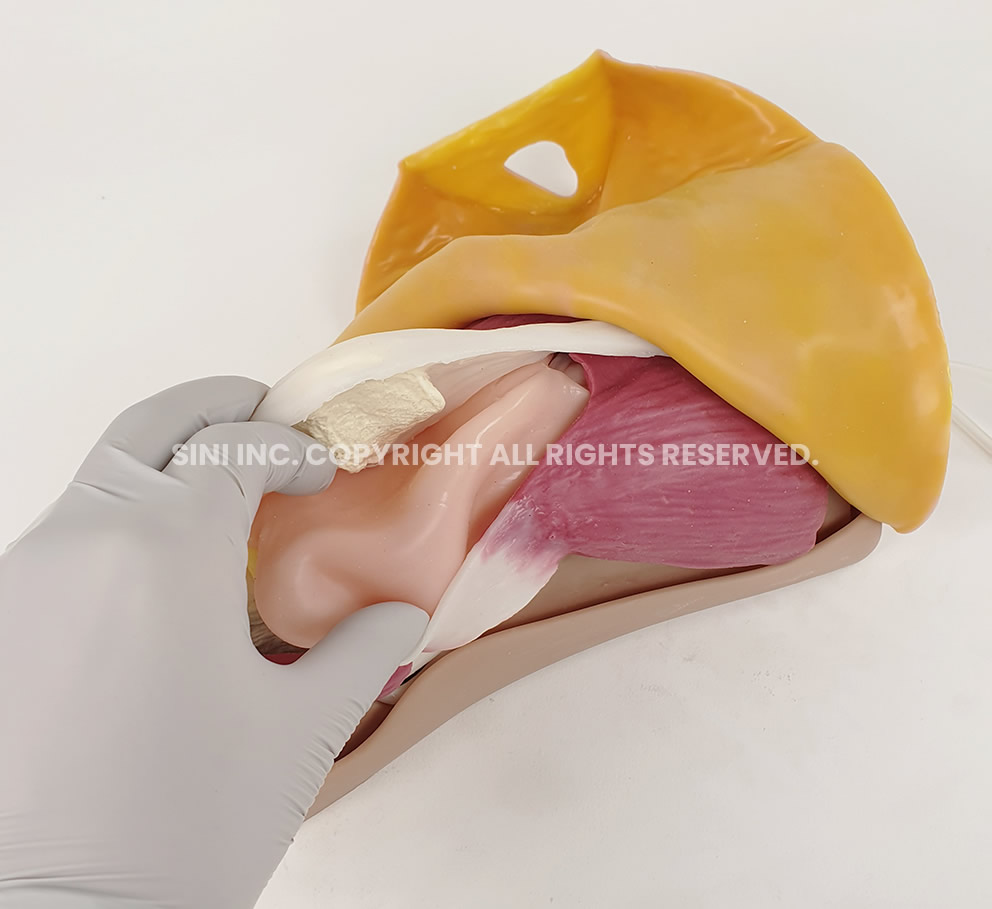
This knee model has a structure of bone, muscle, and joint with femur, tibia, patella, and related ligaments and cartilage. This model is designed for knee aspiration skill training, the users can feel the realistic touch and movement of the patella when they simulate the palpation for inserting a needle. The skin has 3 layers, dermis, epidermis, and fat. We simulate the different skin layers with different materials so that you can feel the realistic tissue response. Ultrasound is also applicable to this model. Despite the fact that the model is designed for knee aspiration, because of the whole anatomical structure simulated, all kinds of knee-related operations are available with this model. For example, Knee implant practice and meniscus tear suture with arthroscopy and skin suture, etc.
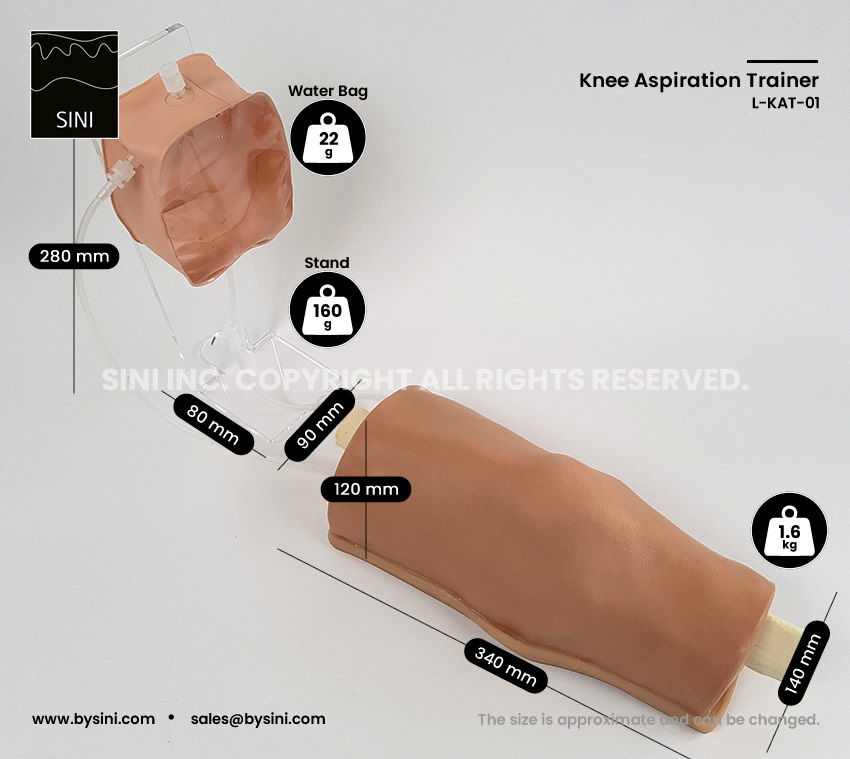
ModelL-KAT-01DevelopmentSINISkills1. Knee aspiration2. Knee arthroscopy skills2. Knee arthroscopy skills4. Skin suture skills5. Tissue managementFeatures1. Realistic tissue response2. Anatomically accurate structure3. Ultrasound applicable4. High durabilitySpec+Knee model x 1ea– 340mm*140mm*120mm / 1600gWater bag x 1ea– 120mm*100mm*50mm / 22gStand x 1ea– 280mm*80mm*90mm / 160g

Knee Surgery Trainer
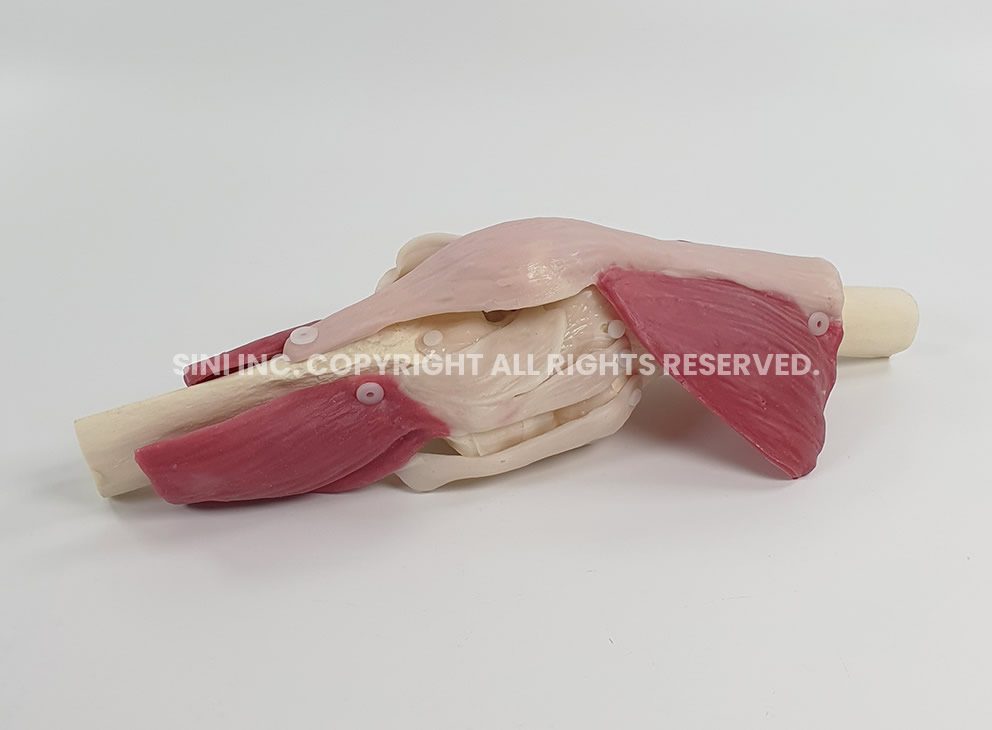
This knee model has a structure of bone, muscle, and joint with femur, tibia, patella, and related ligaments and cartilage. The skin has 3 layers, dermis, epidermis, and fat. We simulate the different skin layers with different materials so that you can feel the realistic tissue response. The material is not only suturable but also has high durability to provide multiple times of use.
You can adjust the femur-tibia angle at your convenience with screws on the stand. Basically, the whole anatomical structure of the knee part has been simulated, all kinds of knee-related operations are available with this model.
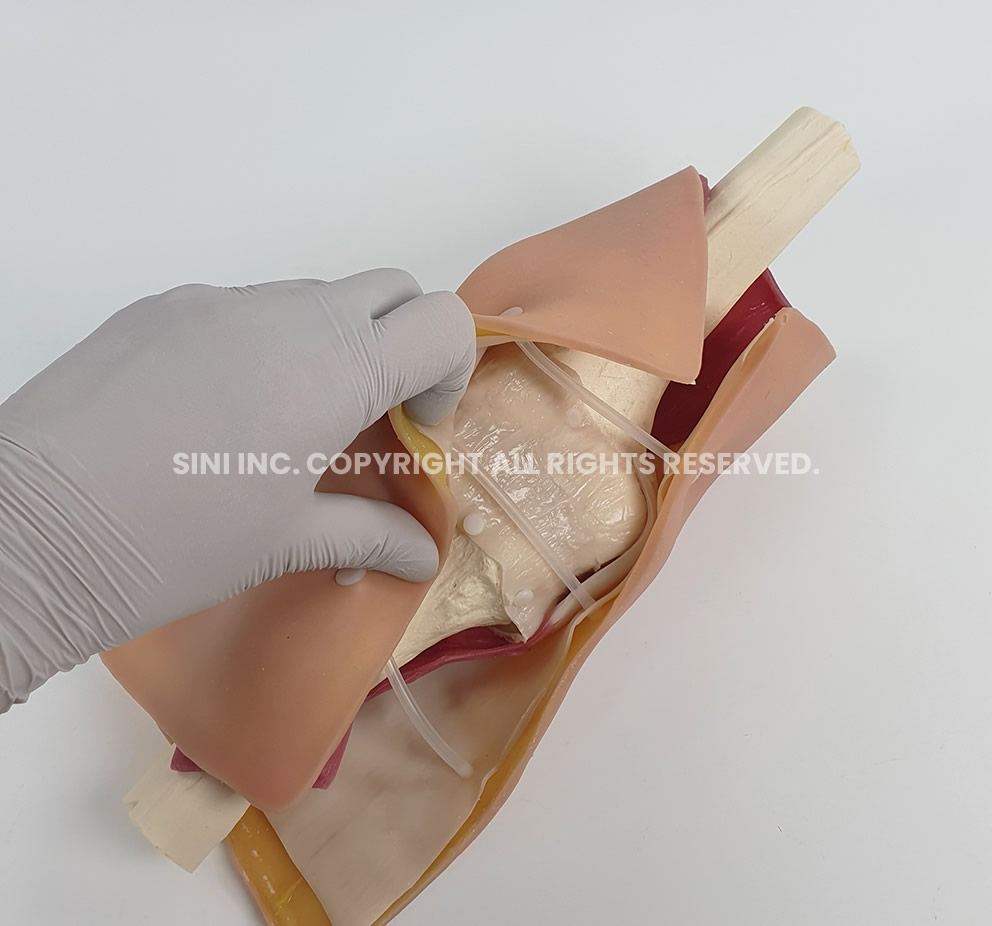
ModelL-KNS-01DevelopmentSINISkills1. Knee surgery2. Knee arthroscopy skills3. Skin suture skills4. Tissue managementFeatures1. Realistic tissue response2. Anatomically accurate structure3. High durabilitySpec+Knee Surgery Trainer x 1ea– 350mm*180mm*130mm / 1680g
















